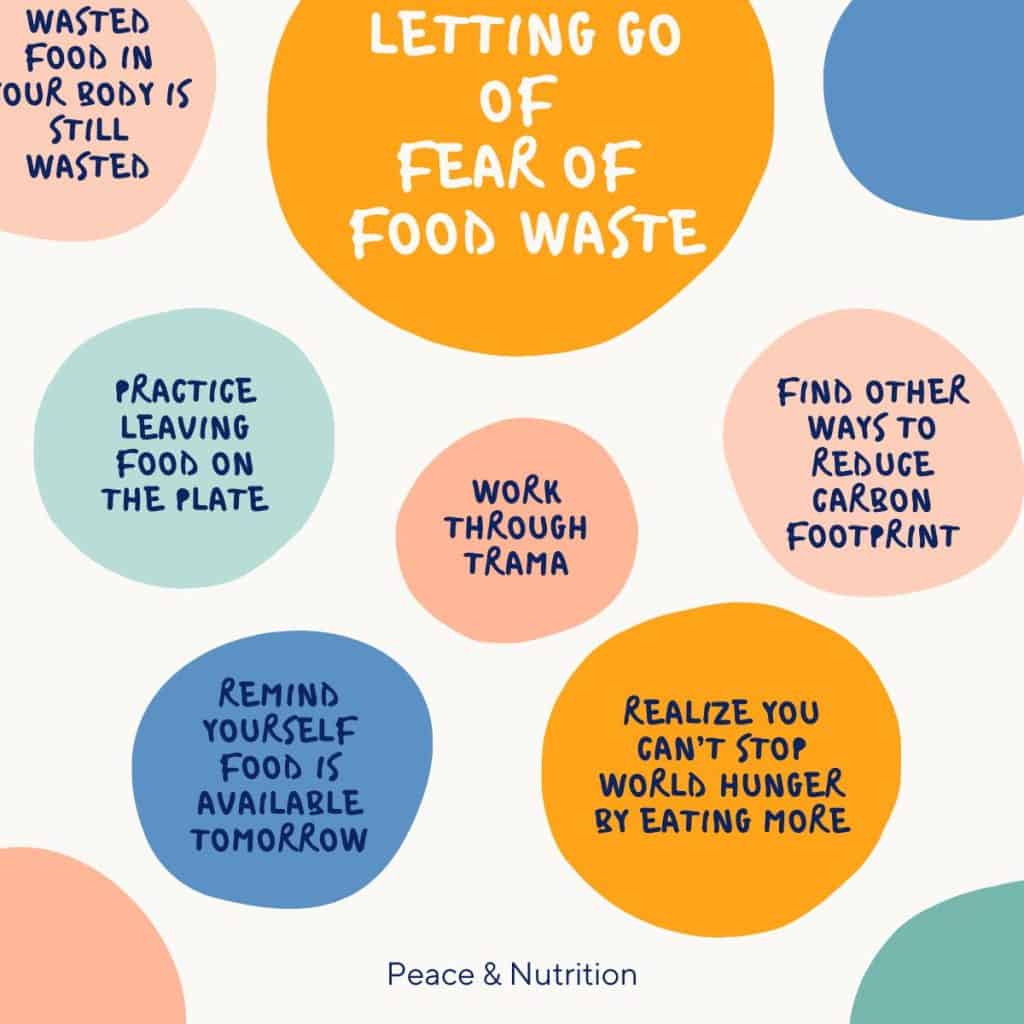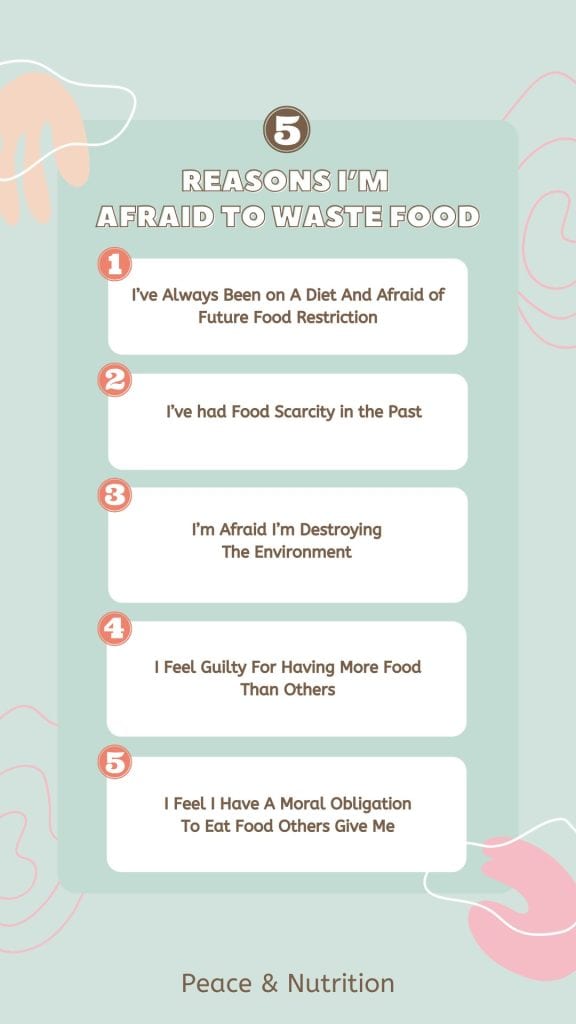Table of Contents
Last updated on September 30th, 2025 at 02:40 pm
You might have grown up hearing messages like “clean your plate” or “don’t waste food when others are going hungry.” While well intended, these lessons can cause a fear of fasting food, leading to difficulty tuning into your body’s hunger and fullness cues. While it seems logical, your anxiety around food waste can lead to a complicated relationship with food including binging and restricting.
For those in eating disorder recovery, this fear of wasting food can feel especially complicated, adding pressure to eat past fullness, avoid trying new foods, or even skip meals to “make up” for food you’ve eaten later. In reality, working through the fear of food waste is not just about reducing guilt. It’s about truly gaining food freedom and learning about your body’s cues.
This article explores some of the reasons why you might fear wasting foods and tools to help you reduce your anxiety around food waste.

Why Am I Afraid To Waste Food
- Perfectionism: You might believe you must make the “right” choice about portions or meals every time. This means that when you believe you have made the “wrong choice” or a “bad choice” you might feel the pressure to get in as much as possible because you intend to restrict your food the next day. I call this the “best meal ever” phenomenon.
- Cultural messages: Growing up with “clean your plate” rules or being told it’s wrong to waste food can cause you to carry this behavior into adulthood. You might not stop to think why this messaging isn’t actually logical or conductive to health.
- Guilt about global hunger: You might feel personally responsible when others in the world don’t have enough to eat.
- Money concerns: Money concerns make everything feel scarce. You might be worrying about the cost of groceries and not wanting to “throw away money.”
- Scarcity mindset: You might have past experiences of food insecurity or food restriction (for example dieting) creating fear of not having enough later.
- Family or social pressure: Your parents, partners, or peers might encourage (or pressuring) you into finishing food to avoid waste.
- Moral beliefs: You might associate food waste with being ungrateful, irresponsible, or “bad.”
- Emotional attachment: You might be linking food with love, comfort, or care, and struggling to let go of it uneaten.
- Environmental concerns: You might be worried about the ecological impact of wasted resources (water, energy, packaging).

How The Fear of Wasting Food Causes Overeating
The fear of wasting food can shift eating decisions from being intuitive and body led to being guilt led which often results in eating more than feels good.
Eating past fullness most frequently comes from feeling like food is scarce. This can be from a history of chronic dieting, lack of money for food, or trauma around food.
When you feel like you can’t waste food you teach your body:
- Your hunger cues can’t be trusted
- You should never eat for emotional reasons
- You should feel guilty every time you eat because food is scarce
- You don’t deserve to eat abundantly
- That you are bad or shameful when you eat
- That you eat abundantly takes resources away from someone else
In reality, all of these fears around food waste actually cause you to eat more, not less. It actually causes you to over-indulge against your body’s natural instincts.
While the goal of not wasting food is often to save money, to appease friends and family or to be a good steward of the environment the actual practice of never wasting food accomplishes none of these things.
In reality, the intention of never wasting food can actually cause us to waste more food because you are afraid to buy and eat the foods you truly desire. It can cause you to feel overwhelmed with the process of stocking the pantry or making a meal because you are afraid to waste anything. In return, the foods that you do purchase are often left to perish because of your fear of being abundant with food.
You may find yourself ordering out or choosing convenience foods because you are hungry and don’t know what to eat. You then might feel like you have an obligation to make the food you order “worth it” because you are already “wasting resources.” Fear of food waste can also lead to food hoarding or hiding food.
9 Tips To Overcome The Fear of Food Waste
In order to overcome the fear of food waste and truly eat intuitively you will need one of abundance. Here are 9 tips to help you transition your mindset around food.
- The money is not coming back: Whether you eat the food on your plate or not, the universe won’t return the money you already spent on it. Eating more food than you are hungry for in a single setting will not improve your overall financial situation or your health. The amount of money you are “wasting” if you throw a portion of your food you’re not hungry for away is often so minimal that you wouldn’t think twice about it if you were to truly calculate the cost out.
- You Have Resources: Even if you grew up with food scarcity, it’s important to acknowledge that you have worked hard to make food abundant now. An abundance of food is a privilege, and if we don’t acknowledge that privilege it’s as good as not having it at all. You don’t honor the privilege of having more food by eating more, but rather by honoring your body’s desire to choose HOW you use the gift of food you’ve been given.
- Honor that You Have Enough To Eat: Dieting can teach you that unconditional permission to eat is a thin person’s privilege. This is not true. But if you have dieted a lot in the past, food might feel scarce all the time because you are always getting ready to restrict it.
- Acknowledge You Have No Control Over World Hunger: The world does not have a food shortage problem. Countries with limited access to food have corrupt political systems and poorly planned production systems that lead to food scarcity around the world. Unfortunately, you have very little impact over world politics. Forcing yourself to finish your plate or allowing yourself to waste the food will do nothing to change the fate of starving children in Africa.
- Focus on the Many Ways To Be Eco-Friendly: You might want to reduce food waste in order to reduce your carbon footprint on the planet. This is a very admirable aspiration. However, wasting a small portion of food now and then will have very minimal if any impact on the environment. If reducing your carbon footprint is deeply important to you, I encourage you to choose other ways to do this such as reducing plastics use, recycling, or choosing public transportation in place of refusing to waste food and disrupting trust with your body. It will have a much greater impact and allow you to honor both your body and the environment.
- Acknowledge Wasted Food in Your Body is Still Wasted: Forcing yourself to overeat out of guilt doesn’t prevent waste; it just transfers the discomfort to you.
- Acknowledge Eating Past Fullness Won’t Heal Past Trauma: A history of food scarcity or using food as a coping tool may cause you to want to use food to soothe or feel safe. Eating more food won’t heal deeply rooted trauma.
- Practice exposure: Leave small amounts on your plate intentionally and notice the feelings that come up. Over time, this reduces anxiety.
- Focus on abundance, not loss: Instead of what’s being “wasted,” focus on what you gained: energy, nourishment, and progress in recovery.

Preventing Food Waste
Wasting food is inevitable and part of a healthy relationship with food. However, becoming more resourceful with how you plan, purchase and prepare food can be an act of self care.
Maximizing how you utilize food can be a creative outlet, help you make food go further, and help you feel motivated to try new things. Sometimes knowing that you did your best to use food to your fullest potential (planning, prepping, and storing) can make it easier to let food go.
Prevent food waste by:
- Serve smaller portions first: You can always go back for more if you’re still hungry.
- Use leftovers creatively: Turn unused ingredients into soups, stir-fries, or smoothies.
- Freeze extras: Freezing prevents food from spoiling and gives you more flexibility.
- Plan loosely: Make flexible meal plans so you can adapt based on what sounds good that day.
- Compost if possible: This can make food “waste” feel less wasteful since it goes back to the earth.
- Diet Culture is Toxic - December 22, 2025
- I Don’t Eat Anything White - December 11, 2025
- I Wish I Had More Control With Food - November 18, 2025